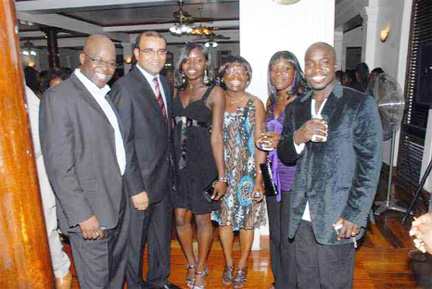The timing couldn’t have been better chosen. As the 2011 general election campaign gradually gathers momentum, President Bharrat Jagdeo told residents of the Buxton-Friendship community “I am not President for PPP, I am President for Guyana. I campaign on a PPP platform but the day after the election that’s my job.”
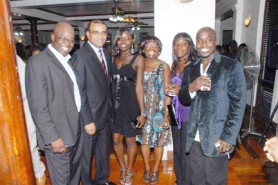
For a President who is constitutionally disqualified from being re-elected to office and who has repeated that he has no interest in running again, his announcement that he campaigns “on a PPP platform” while making on his first visit to the largest African-Guyanese community cannot be ignored.
This has been a very significant season for Buxton-Friendship. It was a celebration of the 170th anniversary of the purchase by 141 free Africans of the former Plantation New Oranje Nassau which was renamed Buxton. It was the traditional annual Emancipation observance. It was also an opportunity for a reunion of members of the diaspora with their relatives and friends. Finally, though, apart from the social agenda, the homecoming had several serious and sober objectives.
Mr Mboya Wood, who is chairman of the US-based 170th Anniversary Celebrations for the Purchase of Buxton Committee, said that the village also hosted an Economic Summit to devise innovative ways of returning Buxton to its “former glory.” It aimed at making the community economically prosperous by using cash incentives to encourage small farmers to return to the land and by bringing out the entrepreneur in others by helping them to invest in small businesses projects. Wood said the intention was to show villagers how small businesses can be sustained over a long period.
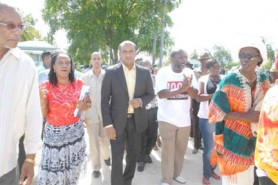
Dr David Hinds, another Buxtonian, explained that the Education Forum “heard gruesome tales of violence, hunger, poverty, illiteracy – the consequence of six years of the worst kind of terror.” Dr Hinds stated “I was moved to point out that Buxton is in a post-war situation and that we should declare a state of emergency. Towards this end, the forum discussed plans to immediately tackle the violence in the schools, hunger and illiteracy. We also planned an outreach to parents. Similar forums were held with farmers and businesspeople. It was agreed that a meeting should be held with the wider community to report and get more input and that a press conference should be called to report to the nation.” In the end, Hinds complained later, “…neither has been held.”
The Diaspora
It was against the background of the aspirations and intentions to improve the community that the decisions by some members of the Buxton diaspora to seek an accomodation with the People’s Progressive Party administration seem to have divided opinion in the community. Emancipation observances had just passed when, on 5th August, the President hosted a reception at State House. Mr Wood said that “many saw the reception as a positive step forward” towards a healing the rift between Buxtonians and the administration.
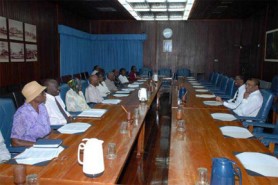
The dinner party, however, attracted a demonstration by other Buxtonians who accused the administration of doing nothing for the village. After the start of the party, a group of protesters held up placards outside State House accusing the administration of neglect of the village. One placard read “Jagdeo and PPP criminalize Buxton; Don’t eat the food and be fooled.” Another read “Jagdeo never visit[ed] Buxton as president; why dine with him?’”
The planning committee also hosted a banquet – the price for attendance at which was beyond the reach of most villagers – at the Georgetown Club. It was attended by Prime Minister Samuel Hinds and four Government Ministers but the only two speakers at the event were the Prime Minister and Mr. Odinga Lumumba – Presidential Adviser on Community Development.
The Troubles
The President, a fortnight after his State House party on 18th August, visited Buxton-Friendship accompanied by Ministers, the Presidential Adviser Odinga Lumumba and Chairman of the Demerara-Mahaica Region Clement Corlette. It was inevitable that the thorny topic of the troubles which affected the village from 2001 to 2008 would be raised.
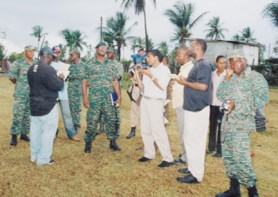
The President sought to avoid controversy by stating plainly “I don’t want to go back and analyse the past and what happened. That is part of our history now. How do we now move forward in regenerating wealth in this community, economic activity so that the people here can find meaningful employment and solve some of their problems? This is what we have to focus on.”
The troubles might be “history’ for the administration but for the community it is a living reality. Villagers feel discriminated against when they seek loans or jobs in Georgetown because of their place of residence. It is not easy for them to forget what happened and, indeed, one resident asked the President for assistance to eliminate the stigma associated with residence in Buxton. The President’s response was “We need to collectively work at removing this perception wherever it exists. So, whatever programmes the state can assist with – through maybe television and radio – we are prepared to do so.” The deep wounds inflicted by both the criminal bandits and the security forces have not healed.
The Guyana Police Force and the Guyana Defence Force – known as the joint services –conducted a series of offensive operations during the troubles in Buxton-Friendship. One such was ‘Operation Stiletto’ during which over 300 homes were searched and 140 villagers were arrested in October 2005. Minister of Home Affairs at the time, Gail October 2005. Minister of Home Affairs at the time, Gail Teixeira, justified the unprecedented, indiscriminate mass arrests, transportation, documentation and photographing of the residents by saying “There will be a database as in other societies…this is nothing unusual. It is done in every part of the developed world.” The President himself praised the security forces for the Operation saying “I must commend the police and army for a well-planned and executed operation.”
During ‘Operation Ferret,’ Donna Marcus-Herod was shot dead. Patrick Sumner and Victor Jones were arrested without warrant, detained, tortured and released without being charged, in September 2007. During Operation ‘Restore Order’ following the Lusignan and Bartica massacres in February 2008, the security forces started to remove vegetation in the village backlands. Minister of Agriculture Robert Persaud did confirm that farmers affected by that operation were compensated for their losses. These events, nevertheless, are raw wounds in the villagers’ memories.
The encounter
The President’s encounter with the Buxton-Friendship community, however, should not be dismissed out-of-hand as counter-productive. He told the villagers, quite sensibly, “If you can’t generate employment and economic activity at the village level everything will suffer. Everyone will suffer because of the linkages that communities have and people to each other.” He said that the state was prepared to help young people who wanted to start farming with land clearing and assistance to get the first crop in the ground. He promised that the Government programmes on pig-breeding and small ruminants could improve the returns livestock-rearing.
President committed his administration to providing assistance to single parents and farmers. He stated that a way had to be found to make the people of the community more marketable. This could be achieved through a national programme for single parents. An industrial training programme which included single parents and the Women of Worth – WOW – facility through which an applicant could be granted a loan without collateral to start businesses was also accessible. He added, “We’re going to give the NGOs here some money to start a hot meal programme for some of the most vulnerable kids in school too.”
All of this could be good news for Buxton-Friendship. Regardless of their suspicions of the motives of the author of the scheme, Buxtonians must demonstrate the level of leadership, generate the depth of interest and exert the energy to exploit the new economic opportunities.
The campaign
The President’s August encounter with Buxton-Friendship was not as sudden as it seems. It has been years in the making. He had a face-to-face meeting with religious and community leaders two years ago on 16th July 2008 at the Office of the President to discuss some of the programmes for the area. Pastor Vibert Moffat of the New Life Full Gospel Church, explaining that the meeting with the President was a follow up to other meetings with the Head of the Presidential Secretariat Dr Roger Luncheon, said that they were “looking forward to close collaboration with a holistic plan.”
There was no ‘holistic plan’ then and there still is none now. The Depressed Communities Needs Committee which emerged out of the 2001 ‘Vlissengen Accord’ between President Bharrat Jagdeo and late Leader of the Opposition Desmond Hoyte facilitated the allocation of funds for four communities.
Each community, including Buxton received $15M for projects that included desilting all street drains within the community by manual labour. That was all.
The administration has insisted, however, that despite allegations of discrimination, everyday governmental expenditure on Buxton-Friendship was never halted during the troubles. Funds allocated in the annual budgets since 2001 were spent on rehabilitating the Buxton Primary and Community High Schools and the Health Centre; constructing a Practical Instruction Centre; building a heavy-duty bridge; rehabilitation of kokers and roads; repairs to breaches of the sea wall; desilting of canals and the improvement of drainage and irrigation infrastructure.
In the final analysis, it is possible that the tawdry methods employed to bring about the President’s dinner party and dialogue with residents have contributed more to dividing, than unifying, the community. For the economic programme to succeed, however, there must be a higher level of community solidarity and visionary leadership. These, unfortunately and unnecessarily, have been damaged by the August encounters and will have to be repaired.
As Dr Hinds wrote of the whole affair, “We have become mercenaries and beggars…What started out as a noble effort to reclaim the dignity of Buxton has ended up as an obscene political manoeuvre in which some leaders have mindlessly and perhaps innocently delivered the village to the political overlords…Mr. Jagdeo does not have to ask for votes, you are campaigning for him.”
